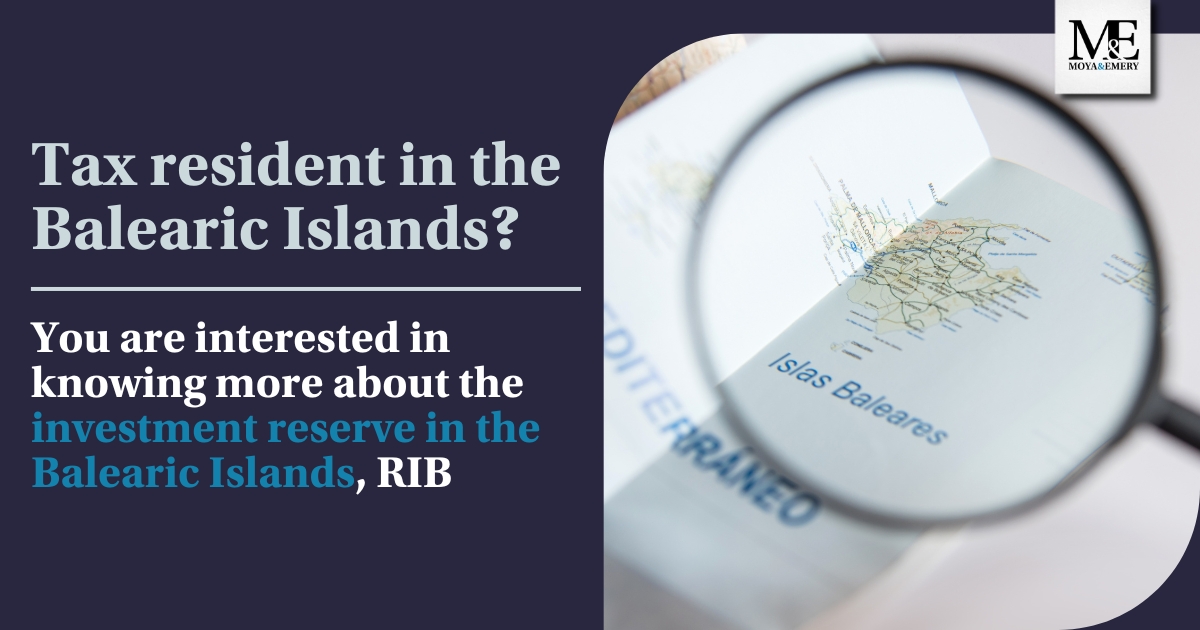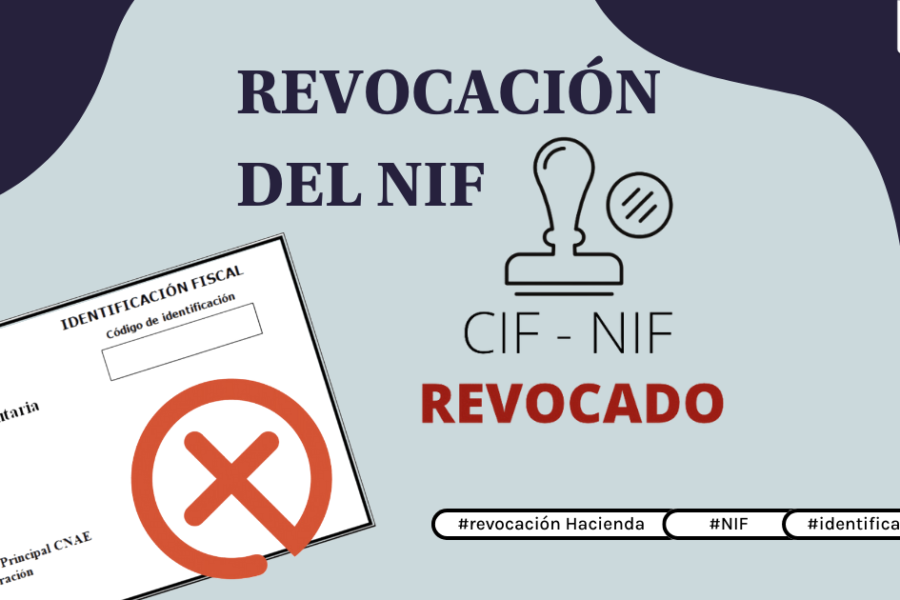Reserve for Investments in the Balearic Islands (RIB)
If you are a resident in the Balearic Islands, you may be interested in knowing about the Reserve for Investments in the Balearic Islands. Read our post and find out what it is, where it is regulated, and its main characteristics.
The Balearic Islands Investment Reserve (RIB) is a fiscal benefit that emulates the Investment Reserve in the Canary Islands (RIC), but applicable in the Balearic Islands for taxpayers of the Corporate Income Tax and the Non-Resident Income Tax.
Among its key features, it stands out for the possibility of reducing up to 90% of the taxable base, provided that an unavailable reserve of the same amount is established. It is essential that this reserve is accounted for with «absolute separation» and reinvestment must occur in the same fiscal year or in the following three fiscal years.
The RIB applies to profits generated by establishments in the Balearic Islands and must derive from economic activities according to the Corporate Income Tax Law, including gains from the transfer of affected assets. However, there are limitations on profit reduction, such as the inability to apply it to those intended for legal reserve, those resulting from the transfer of assets that have materialized RIB investments, those originating from the transfer of shares in companies, as well as those derived from loans. Reinvestment can take various forms, such as tangible or intangible fixed assets, assets contributing to the improvement of the environment in the Balearic Islands, research and development expenses, among others. Additionally, job creation related to these investments is accepted, as well as materialization in stakes in companies making these investments. The importance of mentions in the annual accounts’ notes is emphasized, and specific information obligations for taxpayers are established.
Consequences for non-compliance are detailed, such as regularization with late payment interest and penalties, and serious infractions related to accounting and notes are mentioned. The RIB does not count towards capitalization or leveling reserves.
The main characteristics of the RIB
- It is a reduction of up to 90% of the taxable base, conditioned on establishing an unavailable reserve of the same amount, accounted for with «absolute separation,» and reinvesting the amount in the same fiscal year or the three fiscal years following the benefit’s accrual.
- The reserve must come from profits generated by establishments located in the Balearic Islands.
- They must come from «economic activities» in the sense of the Corporate Income Tax Law. This includes profits from the transfer of affected assets.
- Profits cannot be reduced or destined for legal reserve if they come from the transfer of assets that have materialized RIB investments, from the transfer of shares in companies, and those derived from loans.
Reinvestment must take place in: Tangible or intangible fixed assets (excluding brands and non-patented knowledge) or assets contributing to the improvement and protection of the environment in the Balearic Islands, as determined by regulations, or Research and development expenses derived from research, development, and technological innovation activities, or If it is land, built or not, it must be allocated to:
- Promotion of protected housing, when this qualification is appropriate according to the regulations governing the actions of the Balearic Islands Housing Plan, and is intended for lease by the promoting company.
- Development of industrial activities included in divisions 1 to 4 of the first section of the rates of the Tax on Economic Activities.
- Socio-sanitary activities, residential centers for the elderly, geriatric and neurological and physical rehabilitation centers,
- Commercial areas undergoing a rehabilitation process. It is expected that the regulatory development will shed some light on this point. It could be a reference to concepts of Canary Islands tourism law, as explained a bit below. This Alert is for informational purposes only and does not constitute any type of legal advice.
- Tourist activities regulated in Law 8/2012, of July 19, on Tourism in the Balearic Islands, whose acquisition is aimed at the rehabilitation of a tourist establishment, or the elements must remain in use in economic activity for five years without transferring, assigning, or leasing them to third parties, or if the economic activity is leasing, the RIB can be used for investments, provided that the lessee is not related, nor is it a leasing. In addition, one of the following must be met:
- Be a tourist company (it seems, as it is drafted, that this refers to the lessor)
- Be a lease of protected housing promoted by the taxpayer.
- Be a lease of real estate used for industrial activities (same as mentioned above)
- Be real estate for socio-sanitary activities, residences for the elderly, geriatrics, and neurological or physical rehabilitation centers.
- Be real estate in commercial areas located in areas whose tourist offer is declining, according to Law 8/2012 and Decree Law 1/2013. In this regard, the terminology «areas with declining tourist offer» is specific to Canary Islands tourism regulations, but there is no trace in the Balearic Islands tourism regulations referred to by the RIB, which speaks of «saturated or mature tourist areas.» Since analogy is not appropriate in the application of tax benefits, it would be desirable to correct this reference in the RIB (obviously derived from a copy-paste from the RIC) and use the terminology specific to Balearic Islands tourism regulations to avoid legal uncertainty.
Job creation related to the aforementioned investments is also accepted as reinvestment, which occurs within six months from the start of the investments. The increase in average staff must be maintained for five years (three years in the case of taxpayers applying the small business regime). Reinvestment in stakes in companies that carry out these aforementioned investments is also accepted.
The investee must make the investments within three years from the accrual date of the tax in the year in which the taxpayer established the reserve. The assets in which the reinvestment takes place must remain in operation in the Balearic Islands on the terms mentioned above, and the acquisition value of the investments must reach at least the amount disbursed for the stakes. Investments made by the investee will not entitle to any other tax benefit. Values must be maintained for five years, without transferring usage and enjoyment rights.
Limits of Special Regime Tax Benefits. Tax benefits and European Union Law.
- Application of tax benefits subject to European Union law. Citation of community regulations related to de minimis aid to companies in various sectors.
- Relevance of Tax Benefits and Limits.
- Importance of the mentioned tax benefits.
- Prohibition of exceeding the limits established by community regulations for each sector. (The regulation has not yet been published).
- Limited to a period of three years.
- General limit of 200,000 euros, subject to regulatory development for the calculation.
Informational Declaration on Aid
- Obligation to submit an informational declaration on aid.
- Non-submission or incorrect submission constitutes an offense.
Offenses Related to Accumulation Limits
- Offense for exceeding accumulation limits.
- Fine of 20% on the excess of the established limits.
Conclusions on the RIB
- The RIB consists of a reduction in the taxable base of the applicable tax, for the part of its profits derived from economic activities, including those resulting from the transfer of affected assets, destined for the establishment of a reserve for certain investments in the Balearic Islands.
- The materialization in stakes in companies is accepted (for the creation of a company dedicated to chartering recreational boats).
- General limit of 200,000 euros, subject to regulatory development for the calculation, which as of today has not been published.
- We understand that this limit of 200,000 euros is the maximum amount for the reduction of the tax due in the Corporate Income Tax. That said, we are awaiting the publication of the mentioned regulation.
- The application of the regime is limited to a period of three years.
- This aid granted to the Balearic Islands is known as de minimis aid (ayudas de minimis). These are state aids that EU Member States can provide to companies without the need for prior notification to the European Commission, as long as they comply with certain limits set by EU regulations. These aids are intended to support small and medium-sized enterprises (SMEs) and aim to facilitate access to public financing without significantly distorting competition in the European single market. However, there are specific limits on the maximum amounts that a company can receive over a specified period (usually three years). If tax benefits and other aids received exceed these limits, they may conflict with EU rules on state aid.
Read below the summary that you can find on the website of the Spanish Tax Agency (AEAT) regarding this matter:
Special Tax Regime of the Balearic Islands
If you are a resident in the Balearic Islands, you should read this.
- Where is the special tax regime applicable in the Balearic Islands regulated?
- Reserve for Investments in the Balearic Islands
- Special regime for industrial, agricultural, livestock, and fishing companies
Where is the special tax regime applicable in the Balearic Islands regulated?
The seventy-seventh additional provision of the General Budget Law (LPGE) for 2023 introduces the Special Tax Regime of the Balearic Islands, effective for tax periods starting between January 1, 2023, and December 31, 2028.
Reserve for Investments in the Balearic Islands
(1) Taxpayers of Corporate Income Tax and Non-Resident Income Tax have the right to a reduction in the tax base for amounts allocated from their profits to the reserve for investments in their establishments in the Balearic Islands, according to the provisions of this section.
(2) The reduction applies to allocations to the reserve for investments in each tax period up to 90% of the portion of profit obtained in the same period that is not distributed, to the extent that it comes from establishments located in the Balearic Islands. In no case can the application of the reduction result in a negative tax base.
(…)
(4) Amounts allocated to the reserve for investments in the Balearic Islands must be materialized within a maximum period of three years, counted from the date of accrual of the tax corresponding to the year in which it has been allocated, in carrying out some of the investments indicated in this number.
(5) The assets in which the investment is materialized must be located or received in the Balearic archipelago, used there, affected, and necessary for the development of the economic activities of the taxpayer, except in the case of those that contribute to the improvement and protection of the environment in the Balearic territory.
(…)
(10) Taxpayers referred to in this section may make anticipated investments, which will be considered as materialization of the reserve for investments allocated from profits obtained in the tax period in which the investment is made or in the three subsequent ones, provided that the other requirements set out in it are met.
The materialization and its financing system will be communicated together with the declaration of Corporate Income Tax, Non-Resident Income Tax, or Personal Income Tax for the tax period in which the anticipated investments are made.
(11) The application of the benefit of the reserve for investments will be incompatible, for the same assets and expenses, with deductions to encourage certain activities regulated in Chapter IV of Title VI of Law 27/2014, of November 27, on Corporate Income Tax. It will also be incompatible for the same assets and expenses with any fiscal benefit or measure of a different nature that has the condition of state aid under European Union law, if such accumulation exceeds the limits established in the Community regulations that, in each case, apply.
(…)
(13) Taxpayers of Personal Income Tax who determine their net income by the direct estimation method will be entitled to a deduction in the full quota for the net income from operations allocated to the reserve for investments, as long as these come from economic activities carried out through establishments located in the Balearic Islands.
In order to enjoy the reserve for investments in the Balearic Islands, individuals must keep accounts in the manner required by the Commercial Code and its development regulations from the year in which the profits destined to finance the reserve for investments in the Balearic Islands have been obtained until the year in which the assets subject to the materialization of the investment must remain in operation.
The deduction will be calculated by applying the average tax rate to annual allocations to the reserve and will be limited to 80% of the portion of the full quota that proportionally corresponds to the amount of net income from operations that come from establishments located in the Balearic Islands, provided that the limits established in the Community regulations that, in each case, apply are not exceeded.
Special regime for industrial, agricultural, livestock, and fishing companies
(1) Taxpayers of Corporate Income Tax and Non-Resident Income Tax will apply a 10% bonus on the full quota corresponding to the income derived from the sale of tangible assets produced in the Balearic Islands by themselves, typical of agricultural, livestock, industrial, and fishing activities, in the latter case in relation to captures made in their fishing and aquaculture area. Individuals or entities domiciled in the Balearic Islands or in other territories engaged in the production of such goods in the archipelago, through a branch or permanent establishment, may benefit from this bonus.
(2) The previous bonus will also be applicable to taxpayers of Personal Income Tax who carry out the same activities and with the same requirements as those required of Corporate Income Tax taxpayers, as long as they determine the income by the direct estimation method. The bonus will be applied to the portion of the full quota that proportionally corresponds to the income derived from the mentioned production activities.
(3) The application of the bonus in each tax period will require that the average workforce of the entity in that period is not less than the average workforce for the twelve months prior to the start of the first tax period in which the regime provided for in this section takes effect.
When the entity is constituted within the mentioned twelve-month period, the average workforce resulting from that period will be taken into account.
(4) The bonus will be increased to 25% in those tax periods in which, in addition to meeting the requirement set out in the previous number, there has been an increase in the average workforce of not less than one unit compared to the average workforce of the previous tax period, and this increase is maintained for at least a period of three years from the end date of the tax period in which this increased bonus is applied.
(…)
(6) When the entity is constituted in the first tax period in which the regime provided for in this section takes effect, the application of the bonus will require that said entity meets the requirements for the reduced tax rate for newly created entities regulated in article 29.1 of Law 27/2014, of November 27, on Corporate Income Tax. In this case, the rules established in this number will be followed.
(7) The bonus regulated in this section will not be applicable to income derived from the sale of tangible assets produced in the Balearic Islands characteristic of shipbuilding, synthetic fibers, the automotive industry, steel, and the coal industry.
At Moya & Emery we can help you with your taxes
At Moya&Emery we can help you with your taxes. Need more information or advice on taxes, filling out forms to submit your tax returns, or want to know how to request installment payments or deferrals for your debts with the Administration? Look for information on these matters on our blog and feel free to contact us to request an appointment.
CONTACT FORM
Or fill out our form to get in touch with you.



